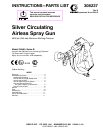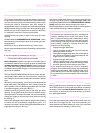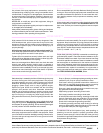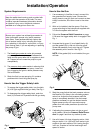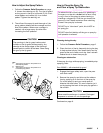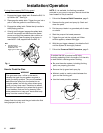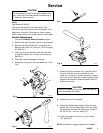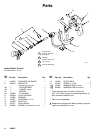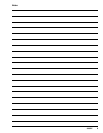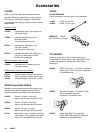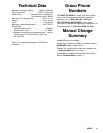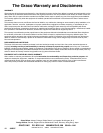
2 308237
WARNINGS
High Pressure Spray Can Cause Serious Injury. For Professional Use Only.
Observe All Warnings. Read and understand all instruction manuals before operating equipment.
FLUID INJECTION HAZARD
General Safety
This equipment generates very high fluid pressure. Spray from
the gun, leaks or ruptured components can inject fluid through
your skin and into your body, and cause extremely serious injury,
including the need for amputation. Also, fluid injected or
splashed into the eyes or on the skin can cause serious damage.
NEVER point the spray gun at any one or at any part of the body.
NEVER put your hand or fingers over the spray tip. NEVER try
to blow back" paint; this is not an air spray system.
ALWAYS have the tip guard in place on the spray gun when
spraying.
ALWAYS follow the PRESSURE RELIEF PROCEDURE, below,
before cleaning or removing the spray tip or servicing any sysĆ
tem equipment.
NEVER try to stop or deflect leaks with your hand or body.
Be sure equipment safety devices are operating properly before
each use.
Medical Alert--Airless Spray Wounds
If any fluid appears to penetrate your skin, get EMERGENCY
MEDICAL CARE AT ONCE. DO NOT TREAT AS A SIMPLE
CUT. Tell the doctor exactly what fluid was injected.
Note to Physician: Injection in the skin is a traumatic injury. It
is important to treat the injury surgically as soon as possible. Do
not delay treatment to research toxicity. Toxicity is a concern
with some exotic coatings injected directly into the blood stream.
Consultation with a plastic surgeon or reconstructive hand surĆ
geon may be advisable.
Spray Gun Safety Devices
This gun has several safety devices. Be sure all of them are operĆ
ating properly before each use. Do not remove or modify any
part of the gun; this can cause a malfunction and result in serious
injury.
Whenever you stop spraying, even for a moment, always set the
trigger safety latch in the engaged or safe" position, making the
gun inoperative. Failure to set the trigger safety latch can result
in accidental triggering of the gun. See Fig. 1.
ALWAYS have the tip guard in place on the spray gun while
spraying. The tip guard alerts you to the fluid injection hazard
and helps reduce, but does not prevent, the risk of accidentally
placing your fingers or any part of your body close to the spray
tip. See Fig. 2.
Always have the trigger guard in place on the gun when spraying
to reduce the risk of accidentally triggering the gun if it is
dropped or bumped. The fluid housing and heat shield act as a
trigger guard for this gun. See Fig. 2.
Spray Tip Safety
Use extreme caution when cleaning or changing spray tips. If the
spray tip clogs while spraying, engage the trigger safety latch
immediately. ALWAYS follow the PRESSURE RELIEF PROCEĆ
DURE, below, and then remove the spray tip to clean it.
NEVER wipe off build-up around the spray tip until the pressure
is fully relieved and the gun safety is engageed.
Pressure Relief Procedure
To reduce the risk of serious bodily injury, including fluid
injection, splashing fluid or solvent in the eyes or on the
skin, or injury from moving parts or electric shock, always
follow this procedure whenever you shut off the sprayer,
when checking or servicing any part of the spray system,
when installing, cleaning or changing spray tips, and
whenever you stop spraying.
. Engage the trigger safety latch.
. Shut off the power supply to the pump and close any
bleedĆtype master air valves.
. Disengage the trigger safety latch. Hold a metal part of
the gun firmly to the side of a grounded metal pail, and
trigger the gun to relieve pressure.
. Engage the trigger safety latch.
. Open the pressure drain valve (required in system),
having a container ready to catch the drainage. Leave
the valve open until you are ready to spray again.
If you suspect that the spray tip or hose is completely
clogged, or that pressure has not been fully relieved after
following the steps above, VERY SLOWLY loosen the tip
guard retaining nut or hose end coupling to relieve presĆ
sure gradually, then loosen completely. Now clear the tip
or hose.
MOVING PARTS HAZARD
Moving parts can pinch or amputate your fingers or other body
parts. KEEP CLEAR of moving parts when starting or operating
the sprayer. Follow the Pressure Relief Procedure, above, beĆ
fore checking or servicing any part of the sprayer, to prevent it
from starting accidentally.
RECOIL HAZARD
Due to the high pressure fluid emitted, a strong recoil action may
occur when you trigger this gun. If you are unprepared, your
hand could be forced back toward your body or you could lose
your balance and fall, resulting in serious injury.



